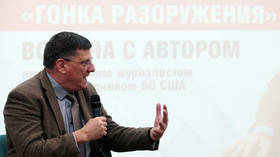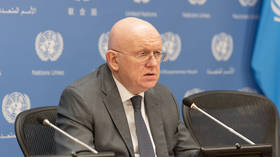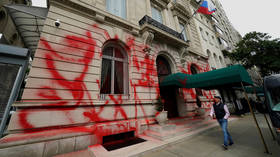'Waging Peace': How a tour of Russia showed me that propaganda perverts reality in the minds of Americans

At the end of April, my daughter Victoria and I departed New York City’s JFK airport, ultimately bound for the Siberian city of Novosibirsk, the first destination of what would be a 26-day, 12-city tour of Russia.
While the official purpose of the visit was business (I was promoting my book, Disarmament Race, which has been published in the Russian language by the Komsomolskaya Pravda publishing house), the unofficial – and for me, most important – purpose of the visit was an opportunity to better understand today's Russia. To do this, I was going to dig deeper into Russian history, get a better grasp of the culture, and, in the process, try to understand the “Russian soul” in as precise a manner as possible.
From my perspective, both objectives were accomplished. I’m inclined to believe that Komsomolskaya Pravda was pleased with the results of a tour that drew positive media coverage, resulted in well-attended town hall-style events involving vigorous question-and-answer sessions, and reportedly resulted in the initial print run of 10,000 books to be sold out in a manner of days. Through the considerable interaction I had with Russians of all walks of life, I came away with deeper insight into the complexity of what comprises the modern Russian nation circa 2023. However, divining an articulable definition of the Russian soul – if indeed possible at all – requires deeper introspection into the plethora of data and experiences captured during this journey than the passage of several days affords and is beyond the scope of this article.
I left on this adventure fully cognizant of the existence of an informational pandemic in America known as Russophobia, and I always believed that I was realistic as to the challenges that I would have to face in trying to convert my Russian experience into a fact-based vaccine to counter this disease of the American mind. However, the scale of the obstacles that I imagined overcoming paled in comparison to the reality that hit home literally as I stepped off the aircraft on our way back home, when Victoria and I were both pulled out of the passport checkpoint for an hours-long interrogation by investigators from Customs and Border Protection who specialize in travelers from designated nations such as Russia.
I will start by noting that the treatment my daughter and I received was professional and courteous. I understand the political reality of the times we live in, and the perceived necessity of questioning US citizens who travel to Russia while relations between our two nations are at an all-time low. My concern is not in the conduct of the interrogation, but rather the substance of the foundational information upon which the questions asked of me were based. As the CBP officer admitted, he had interviewed hundreds of Russians after the start of the military operation in Ukraine in February 2022. The picture he had of Russia was singularly grounded in the perspective of political dissidents who had a bone to pick with President Vladimir Putin, and the narrative that they painted about Russia had become gospel for the CBP. By extension, it has heavily influenced the overall assessment by the US government, since these dissident debriefings constitute a major source of the primary intelligence used by national security analysts throughout the American intelligence community.
In short, my interrogation quickly became a debate between myself on the one hand, and a combination of Alexey Navalny (the imprisoned Russian opposition figure who most of the Russian dissidents support, according to the officer) and the Ukrainian government on the other. Virtually every point I made was immediately defined as “pro-Russian propaganda.” I tried to impress upon the CBP officer the reality of Russia, today, especially concerning both the high level of support for, and underlying criticism of, the Russian government about the military campaign in Ukraine. However, in the end my arguments, and the facts they were based upon, were categorized as “Kremlin talking points” no matter how hard I tried. I left the interrogation with a new appreciation of how deeply ingrained into the intellectual DNA of the official US government the Navalny and Ukrainian narratives have become, and how difficult it will be to root them out.
I had held out a modicum of hope that I would be able to engage in a responsible fashion with some elements of the mainstream media about my visit and what I experienced and, in doing so, help make inroads in countering the official US line on Russia. As such, when I was contacted by a local columnist for the major regional newspaper, I called him back in hopes that he would be interested in writing something that accurately captured the substance and tone of my trip.
I am not naming either the newspaper or the columnist, for the simple fact that I do not know if there will be an article or what the actual content would be. However, what I do know is this – he was familiar with many of the interviews I gave while in Russia (they were published on US social media), and as such, sufficiently empowered to ask relevant questions.
Instead, the columnist sought to cherry pick statements I made during these interviews, void of any factual context, to paint me as a pro-Russian shill. And when I pushed back, he then turned to the age-old tactic of bringing up a past criminal conviction as a way of defining me and, by extension, my trip. This, apparently, is what passes for journalism in America today. I hope that events prove me wrong, but this is not my first media rodeo – I know how the game is played, and how the players behave. Sadly, any hope I had placed on garnering the support of local, regional, and national mainstream media in helping disseminate my Russian experiences, insights, and analysis in an accurate and fair manner appears to have been misplaced. The mainstream media will continue to do what it has done for many years now – mindlessly echo the official narrative and undermine anyone who dares challenge it.
Upon my return home, I was able to access my email account, which I was not able to do while in Russia, and immediately stumbled upon an intramural discussion among people I respect, who possess similar professional backgrounds and anti-war inclinations. It revolved around the issue of whether there was anything more Russia, and in particular Putin, could have done to avoid a war in Ukraine. Some amongst this group insisted that Putin had no choice but to act, while others argued that there were always options short of war that could have been pursued.
What struck me about this debate was the reality that, save for very few exceptions, the underlying analysis was conducted from an American point of view, with little or no regard as to what would be politically possible in Russia, or what the factual foundation of the problems being discussed were. The mirror-imaging of American perspectives onto Russian reality resulted in the creation of a counter-narrative that was as fundamentally flawed as it was factually challenged. For those who argued that Putin could have avoided war, their arguments lacked any grounding in Russian reality or the facts of the case.
The lack of insight into how Russia functions created artificial expectations of Russian behavior which, when not met, generated angst among the participants about the irresponsible actions of Putin and his government that in turn helped feed an overall anti-Russian narrative. As this debate underscored, even among well-meaning people inclined to have an open mind about the country, Russophobia and an overall ignorance of the Russian reality creates pre-conceived intellectual obstacles which are difficult to overcome.
The byproduct of such a fundamentally flawed approach toward understanding Russia is the hate-filled rhetoric of officials like South Carolina Republican Senator Lyndsey Graham, a lifelong Russophobe, who has crowed about US taxpayer dollars used to finance military aid to Kiev being “the best money we’ve ever spent” and gloated about how “Russians are dying” in the war. Under normal circumstances, such blood curdling rhetoric would be openly challenged by most Americans as unreflective of our values. Russophobia, however, is a disease of the mind, the symptoms of which are the termination of rational thought.
My work is cut out for me. While daunted by the challenges that immediately manifested themselves upon my return, I am optimistic that I will succeed. I remain empowered and emboldened by the strength of the impressions made upon me during my journey inside Russia, especially the enthusiasm of the people who entrusted me with this experience. I am also encouraged by the support that exists in the world of social media, where ideas that challenge the official narrative are freely exchanged, generating momentum that has the potential to shape the minds and attitudes of a significant number of my fellow Americans.
The defining theme of my Russian visit and the journey of education and awareness derived from this trip is “Waging Peace.” The underlying assumption made in selecting this theme is that the processes envisioned from it involve inevitable conflict of an ideological nature. To prevail, those engaged in this campaign will need to muster all the fact-based arguments possible to counter the government-backed mainstream narrative. This sort of activity cannot occur in a vacuum, but rather must be rooted in the age-old maxim of “know your enemy.”
Rather than being disheartened by the reality of the CBP questioning, the pre-conceived slant of American reporters, or the lack of viable Russian context in the relevant debates and discussions about the country taking place in the US, right now, I am empowered by the fact that I have come face to face with the enemy early on in this struggle, have familiarized myself with their modus operandi, and as such will be able to make the appropriate adjustments in strategy and tactics necessary to prevail.
The war against Russophobia was never going to be an easy one. But for the sake of the future of America, Russia, and the rest of the world, it is one that must be won. “Waging Peace” is not a casual cause, but rather a struggle of existential proportions.
We will win, if for no other reason than defeat is not an option.
The statements, views and opinions expressed in this column are solely those of the author and do not necessarily represent those of RT.
















